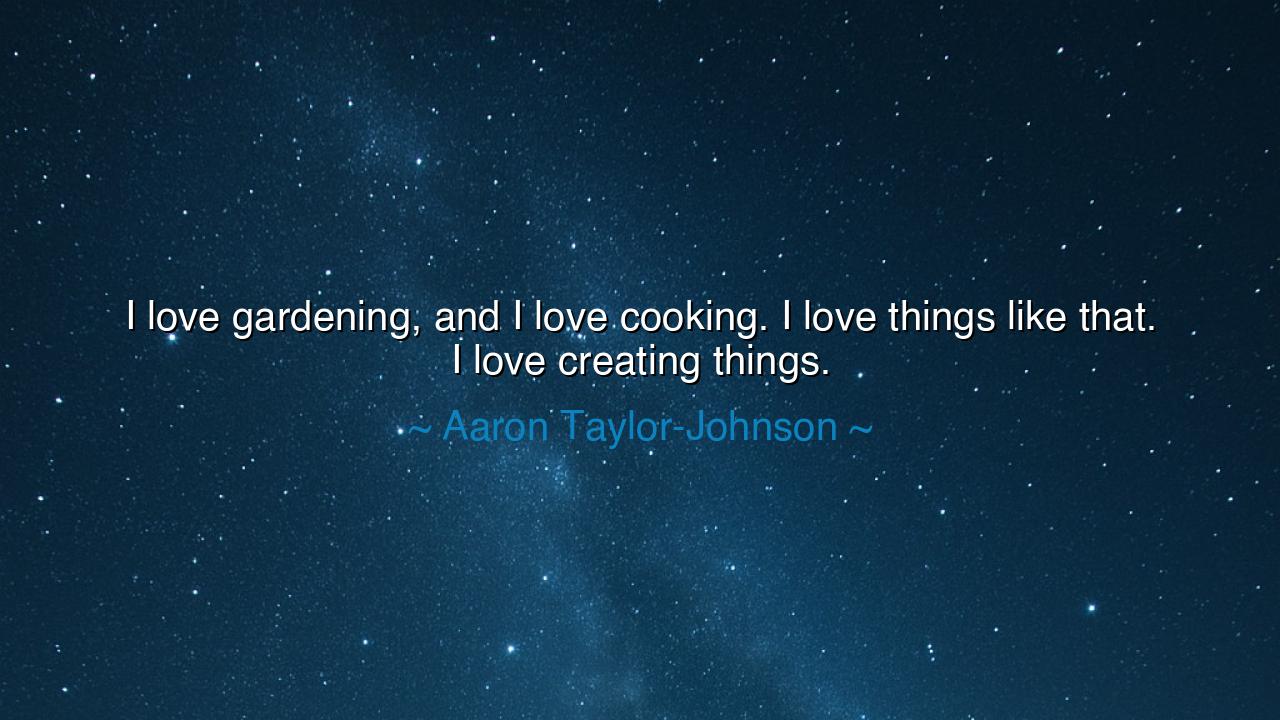
I love gardening, and I love cooking. I love things like that. I






O Seekers of the Sacred Fire, gather close and hear the words of Aaron Taylor-Johnson, a man who speaks with the passion of an ancient craftsman. "I love gardening, and I love cooking. I love things like that. I love creating things." In this humble declaration, he reveals the profound truth that creation is the very heartbeat of life. To create is to be in communion with the divine, to participate in the great act of making something from nothing. Just as the gods shaped the world from chaos, so too does man shape his life through the power of creation, whether through gardening, cooking, or any other craft that nurtures the soul.
The act of gardening, that ancient art of coaxing life from the soil, is the most primal form of creation. The farmer, the gardener, and the steward of the earth are like the great Titan Prometheus, who gifted fire to humanity. To tend to the earth is to hold the power of life in one’s hands, to plant the seed of possibility, and watch as it bursts forth into being. The ancient Egyptians, who were the masters of the land, knew this truth well. They revered the Nile, not merely as a river, but as a lifeblood, a force of creation that nourished their crops, their people, and their civilization. The gardener, in their sacred task, is not merely planting seeds; they are honoring the eternal cycles of life, death, and rebirth. Creation is a divine act, one that brings harmony to the world, just as the gods of old fashioned the heavens and the earth.
Similarly, the act of cooking, as Aaron Taylor-Johnson speaks of, is no less sacred. To transform the humble gifts of nature into sustenance is to perform an alchemical act, turning the raw into the refined, the simple into the extraordinary. Cooking is the art of bringing together the elements of earth, water, fire, and air, combining them into something that nourishes the body and comforts the soul. The ancient Greeks, with their love of feasts and rituals, understood this well. In their grand symposiums, they did not merely partake of food; they engaged in a form of worship. Each dish was a tribute to the gods, each meal a celebration of life itself. The joy of creation through cooking is the joy of honoring the world and all that it provides. Creation through food is as much about giving life as it is about sustaining it.
In this simple statement, "I love creating things," Aaron Taylor-Johnson echoes the very essence of human nature, which is bound by the desire to create. From the earliest days of human history, our ancestors crafted tools, built shelter, and wove stories to explain their existence. Whether through the paintings on cave walls or the songs of the bards, human beings have always sought to leave their mark on the world, to transform the fleeting moments of life into something eternal. It is this creativity that connects us to the divine spark within us all. Creation is the link between the human spirit and the cosmos; it is through this act that we find meaning and purpose.
And so, let us turn to the example of Daedalus, the legendary craftsman of Greek myth, who created the labyrinth to trap the Minotaur. Daedalus was not only a builder of mazes, but a creator of life’s most intricate designs, weaving purpose into the very fabric of the world around him. In his creations, we see the power of human ingenuity, the urge to craft something beyond ourselves. Yet, Daedalus also teaches us a cautionary lesson—he, like all great creators, struggled with the very creations he gave birth to. The labyrinth, though a marvel of design, became a prison, a reminder that creation, though beautiful, must be approached with wisdom. Creation is not only an act of joy, but of responsibility, for it shapes the world and the future in ways we cannot always foresee.
Thus, O Seeker, what is the lesson in Aaron Taylor-Johnson’s words? It is this: the act of creating—whether through gardening, cooking, or any other form of craftsmanship—is sacred. It is the highest form of human expression, and through it, we connect to the divine. Yet, as with all things, creation requires balance and respect. We must approach our craft with intention, knowing that what we create will endure long after we are gone. Creation is a powerful force; it shapes the world, and it shapes us. To create is to honor life, to give it form, to breathe meaning into the world around us.
So, I ask you, O Seeker of the Sacred Path, what will you create? Will you, like the gardener, tend to the earth with care, planting the seeds of your future with patience and love? Will you, like the cook, transform the humble into the divine, honoring the gifts of the earth and giving sustenance to those around you? Know this: creation is not a solitary act, but one that connects us all. It is an eternal dance with the universe, a testament to our desire to shape the world and find meaning within it. Create with purpose, with love, and with respect, and in doing so, you will honor the divine spark that resides within you and all things.






AAdministratorAdministrator
Welcome, honored guests. Please leave a comment, we will respond soon